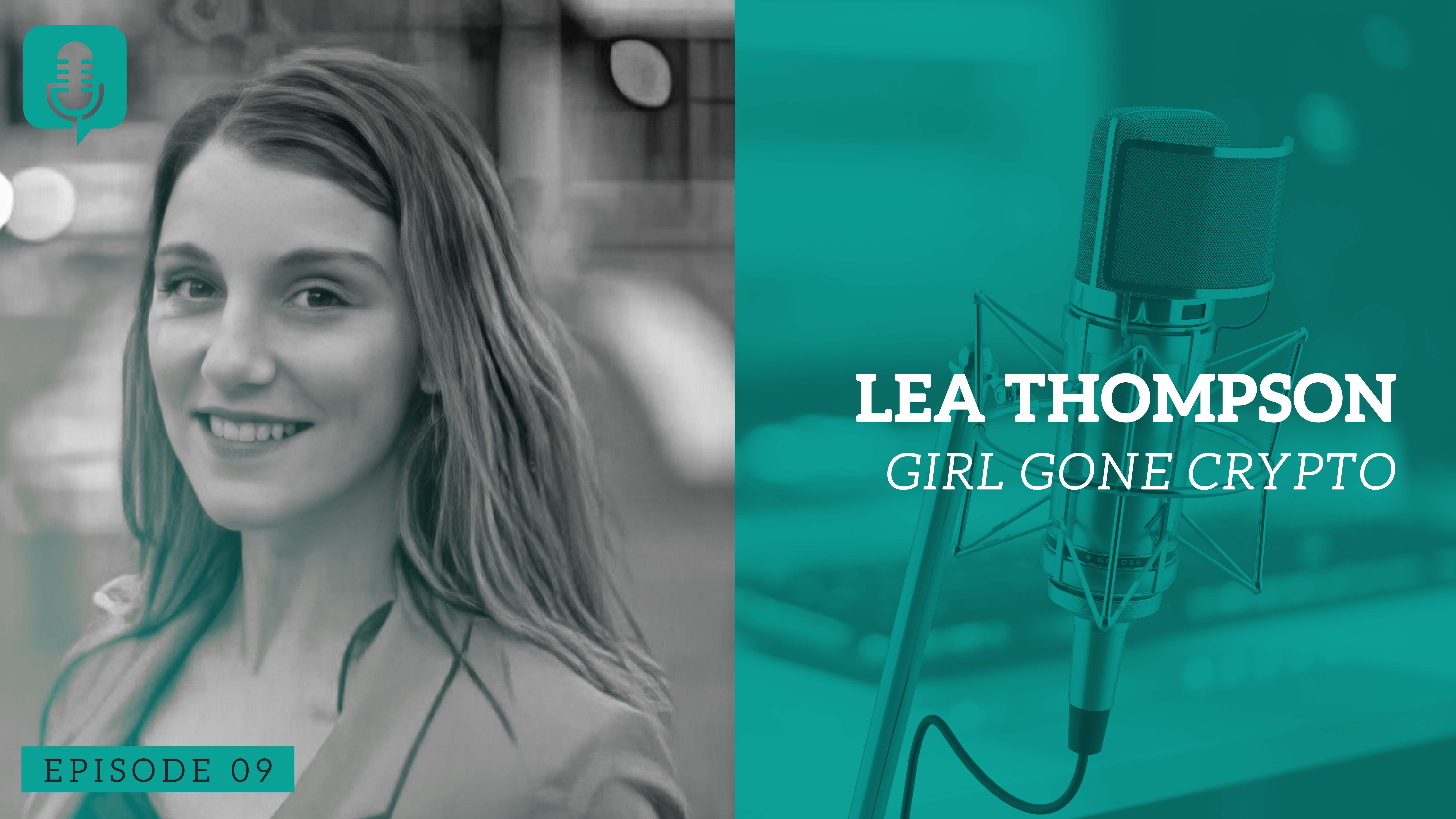The world of cryptocurrency is often perceived as complex, exclusive, and intimidating to newcomers. But thanks to creators like Lea Thompson, known online as Girl Gone Crypto, that perception is rapidly changing. In Episode 9 of the Sazmining Podcast, host Will Szamosszegi speaks with Lea about her personal journey into crypto, the underrated power of Bitcoin, common misconceptions about blockchain, and how mass adoption might unfold in the coming years.
Lea is not only a passionate crypto advocate—she’s a trailblazer who’s using social media and video content to educate, entertain, and inspire a more diverse group of people to participate in the blockchain revolution.
From Music Covers to Crypto Keynotes: Lea’s Unlikely On-Ramp to Blockchain
Lea’s introduction to crypto wasn’t through mining rigs or technical whitepapers—it began with curiosity and content creation. In 2017, she stumbled upon Steemit, a blockchain-based blogging platform that rewards users with cryptocurrency for their content. Her very first post? A ukulele cover. Surprisingly, she earned $100 worth of Steem tokens from that video, which sparked a cascade of questions: Why was this worth anything? What’s an exchange? How does this system work?
Owning even a small amount of cryptocurrency pushed her down the crypto rabbit hole. Instead of brushing off Bitcoin as a niche or risky digital fad, she started asking deeper questions and began learning about hardware wallets, BTC pairs, and the foundations of decentralized finance. That curiosity eventually led her to build “Girl Gone Crypto,” a brand dedicated to demystifying blockchain and onboarding the next generation of crypto users.
The Birth of Girl Gone Crypto: A Passion-Driven Project
Before launching Girl Gone Crypto, Lea spent years creating general content on Steemit—everything from recipes to random lifestyle videos. But as she connected more with the crypto community and was invited to speak at conferences (despite not having crypto-focused content at the time), she recognized a growing demand for authentic, approachable voices in the space.
She decided to niche down, combining her love for content creation with her passion for blockchain. The result was a focused brand centered on making crypto less intimidating and more accessible. One year into her journey as Girl Gone Crypto, Lea had already built a loyal following and attended multiple conferences as a featured speaker. Her secret? A relentless commitment to educational and engaging content that resonates with both beginners and blockchain veterans alike.
The Importance of Earning Crypto Firsthand
One of Lea’s core philosophies is that people don’t really “get” crypto until they own some. She emphasizes that earning crypto—rather than just buying it—is often the most powerful gateway to understanding its value.
For her, the Steemit platform was that gateway. For others, it might be a crypto-based game, a decentralized app, or a rewards program. What matters most is having a low-friction on-ramp that allows users to interact with blockchain technology without needing to set up complicated wallets or navigate technical jargon right away.
This belief has shaped the kind of projects she promotes and partners with.
Projects That Lower the Barrier to Entry
When asked about blockchain projects she believes have mass adoption potential, Lea doesn’t point to the flashiest or most hyped-up protocols. Instead, she’s focused on tools that make onboarding easier and mimic real-world behavior.
She highlights Lolli, a browser extension that lets users earn Bitcoin for shopping at major retailers. It’s familiar, simple, and frictionless—making it ideal for mainstream users. Even her mom uses it.
She also praises crypto wallets like Edge and ShapeShift that prioritize user-friendly design, as well as exchanges like Gemini that have simplified the buying experience. For Lea, it’s not about dumbing down the technology—it’s about making the interface intuitive while maintaining security on the backend.
This focus on UX and simplicity is vital for attracting users outside the tech-savvy blockchain bubble.
Common Myths About Bitcoin and Blockchain: Debunked
One of the most persistent myths about cryptocurrency is that it’s “just for criminals.” This narrative, often perpetuated by legacy media outlets, overlooks the fundamental privacy-enhancing features of blockchain and paints decentralized systems with an unfair brush.
Lea offers a compelling rebuttal with a quote from Edward Snowden: “Saying you don’t need privacy because you have nothing to hide is like saying you don’t care about free speech because you have nothing to say.”
Bitcoin and other cryptocurrencies offer self-sovereignty, not secrecy for secrecy’s sake. They allow users to control their assets without relying on third-party institutions. In an era of increasing financial surveillance, economic instability, and central bank overreach, this feature is not only desirable—it’s essential.
The Role of Content in Driving Adoption
Lea firmly believes that video content is the most powerful tool for building trust and driving crypto adoption. Video allows creators to convey tone, emotion, and sincerity in a way that written content often can’t. It also helps audiences connect on a more human level, which is key for a movement that’s still misunderstood by the masses.
When it comes to building a personal or company brand in crypto, Lea recommends:
- Prioritizing Twitter for conversation and visibility (especially with Bitcoin hashtags for discovery)
- Leveraging YouTube for deeper educational content
- Using LinkedIn for more formal thought leadership and business networking
- Repurposing content across platforms, particularly using short-form video from TikTok or Instagram Reels for virality
According to Lea, platforms like Twitter and TikTok offer creators the best chance for organic reach and virality, making them powerful distribution channels—even for accounts with small follower counts.
TikTok and the Rise of Micro-Content in Crypto
Although some in the crypto community are skeptical of TikTok due to privacy concerns, Lea believes its bite-sized, highly engaging format is exactly what crypto needs to reach new audiences.
She’s seen massive success using TikTok to explain complex topics in simple, fun ways—some of her videos have even gone viral with millions of views. When reposted on Twitter or Instagram, those videos often outperform everything else.
The key takeaway? People love digestible content. A 15-second clip that makes someone laugh or raises a thought-provoking question can be more effective than a 30-minute explainer. This is especially true for Gen Z and younger millennials who consume content differently than older generations.
A Creator’s Toolkit: Getting Started with Video Content
For aspiring crypto content creators, Lea offers encouragement: You don’t need fancy equipment to get started. In fact, she recommends using your smartphone, natural light, and a stack of books as a makeshift tripod if that’s all you have. iMovie or other basic editing tools are more than enough at the beginning.
Her advice is simple: start now, improve later.
Too many people let perfectionism get in the way of publishing. The most important thing is showing up consistently and speaking from a place of authenticity. As she puts it, “You miss all the shots you don’t take.”
Why Bitcoin Matters More Than Ever
With governments around the world printing unprecedented amounts of fiat currency, inflation concerns are growing. Lea sees this moment as a tipping point—a time when more people are questioning the foundations of the financial system, and open to alternatives like Bitcoin.
She explains Bitcoin’s value in terms of fixed supply and predictable monetary policy. Unlike fiat currencies, which can be inflated at will, Bitcoin has a hard cap of 21 million coins. This makes it sound money—similar to gold, but with better portability, security, and transparency.
In times of economic uncertainty, the demand for assets like Bitcoin increases. As more people begin to understand how inflation erodes purchasing power, Bitcoin offers a compelling hedge.
The Bigger Picture: Financial Freedom and Self-Sovereignty
Lea’s passion for crypto isn’t just about profits or decentralization for its own sake—it’s rooted in her core belief in personal responsibility and freedom.
She sees Bitcoin and blockchain as tools for reclaiming control over your life—especially your financial future. Whether it’s by opting out of inflationary monetary systems, controlling your private keys, or participating in decentralized platforms, crypto empowers individuals in a way that traditional systems don’t.
She also advocates for greater diversity in crypto, especially encouraging women and underrepresented groups to join the movement. Platforms like Instagram and Pinterest, she believes, can be gateways to introducing crypto to new audiences through relatable, lifestyle-friendly content.
Favorite Books and Influences
Lea cites Atlas Shrugged by Ayn Rand as a formative influence, praising its themes of personal accountability and self-determination. She also recommends The Creature from Jekyll Island by G. Edward Griffin for those who want to understand the monetary system and the Federal Reserve in depth.
These books helped shape her worldview and reinforce her conviction that blockchain is more than a tech trend—it’s a philosophical movement for economic empowerment.
What’s Next: The Final Message She’d Leave Behind
If she could create just one more video before never being allowed to publish again, Lea says she’d make it about taking control of your life. Her message would be simple: Life is short, full of opportunity, and worth enjoying.
Too often, people let fear or circumstances stop them from pursuing what they love. Whether it’s starting a YouTube channel, learning about Bitcoin, or building a business—start where you are, use what you have, and take the first step.
Conclusion: Girl Gone Crypto is Just Getting Started
Lea Thompson is more than just a content creator—she’s a vital bridge between the blockchain world and the mainstream public. Through her approachable style, educational content, and unwavering belief in the power of self-sovereignty, she’s helping to drive the next wave of crypto adoption.
As Bitcoin gains traction and blockchain use cases expand, voices like Lea’s will be crucial in shaping how the world understands and embraces this new financial paradigm.
If you’re looking for inspiration, insight, or just a fun way to learn about crypto, Girl Gone Crypto is a name to follow.
Follow Girl Gone Crypto:
Find her on Twitter, YouTube, TikTok, Instagram, and LinkedIn under the handle @GirlGoneCrypto.
Subscribe to the Sazmining Podcast
Enjoyed the episode? Don’t miss out! Subscribe to the Sazmining Podcast for more conversations with blockchain innovators and industry leaders.
Follow us on YouTube, X, and LinkedIn.
Discover all episodes at https://creators.spotify.com/pod/show/sazmining.
If you want to hear us interview a particular guest on a future episode, please reach out to us@podcastsamining.com.

